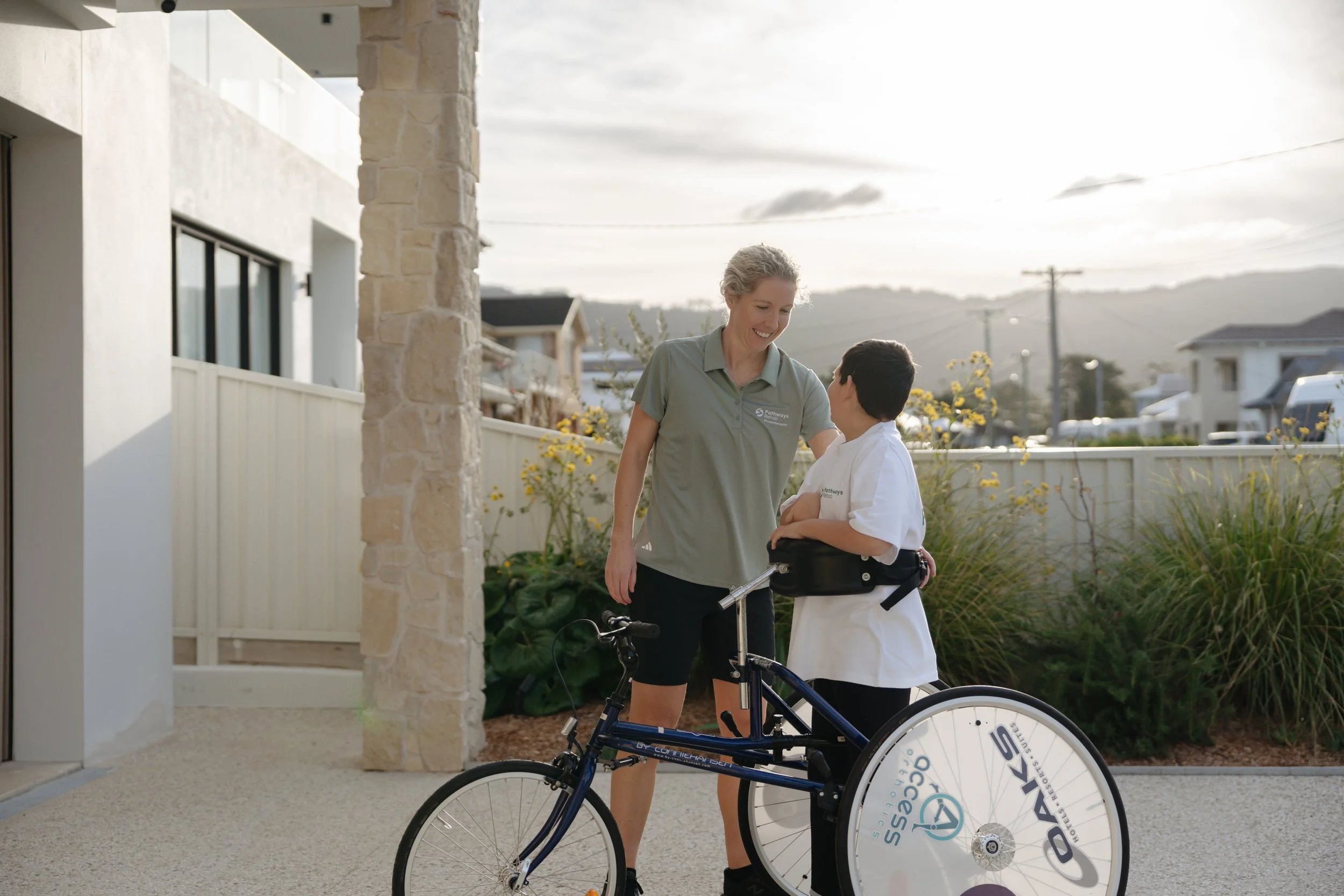What we do
We provide a range of physiotherapy services to ensure everyone has the best opportunity to achieve their goals.
-
Frequently scheduled therapy, advancing progress towards your goals. We are certified in delivering evidenced based programs including the “LSVT-BIG” program for Parkinson's Disease and “MS get a head start” program for Multiple Sclerosis.
-
Focuses on treating and managing conditions affecting the lungs and airways. Includes teaching strategies and techniques to help clear mucus, improve breathing, and enhance lung function. We can recommend and teach you to use devices that improve breathing and reduce the risk of chest infections.
-
Therapy that uses the properties of water to aid in exercise and rehabilitation. The water supports the body, making movement easier and more comfortable while helping to improve strength, balance, flexibility.
-
Employs techniques such as joint mobilisations, soft tissue release, or dry needling to reduce pain, improve flexibility, and support functional movement.
-
Teaching care supports how to assist with exercise programs, providing a manual for safe transfers and mobility or demonstrating techniques to manage posture, muscle tone, and prevent pressure injuries.
-
A technique used to gently improve joint range of movement by applying a series of casts. Each cast holds the joint in a slightly more stretched position to gradually reduce muscle tightness and increase range of movement.
-
Assessment and trial of mobility aids like walking and standing frames, along with transfer aids such as gait belts, transfer boards, and hoists to enhance independence. May include referrals for orthotics or special technology to support your balance and walking.
-
Tailored exercise programs designed to improve strength, flexibility, balance, coordination, and endurance based on individual needs.
-
Supports relearning and improving daily activities such as getting in and out of bed, standing, walking, stair climbing, and running to regain independence and confidence at home and in the community.
-
FES uses small electrical pulses to activate weakened muscles, helping to improve movement and function. It’s often used to support walking, hand function, or muscle strengthening.
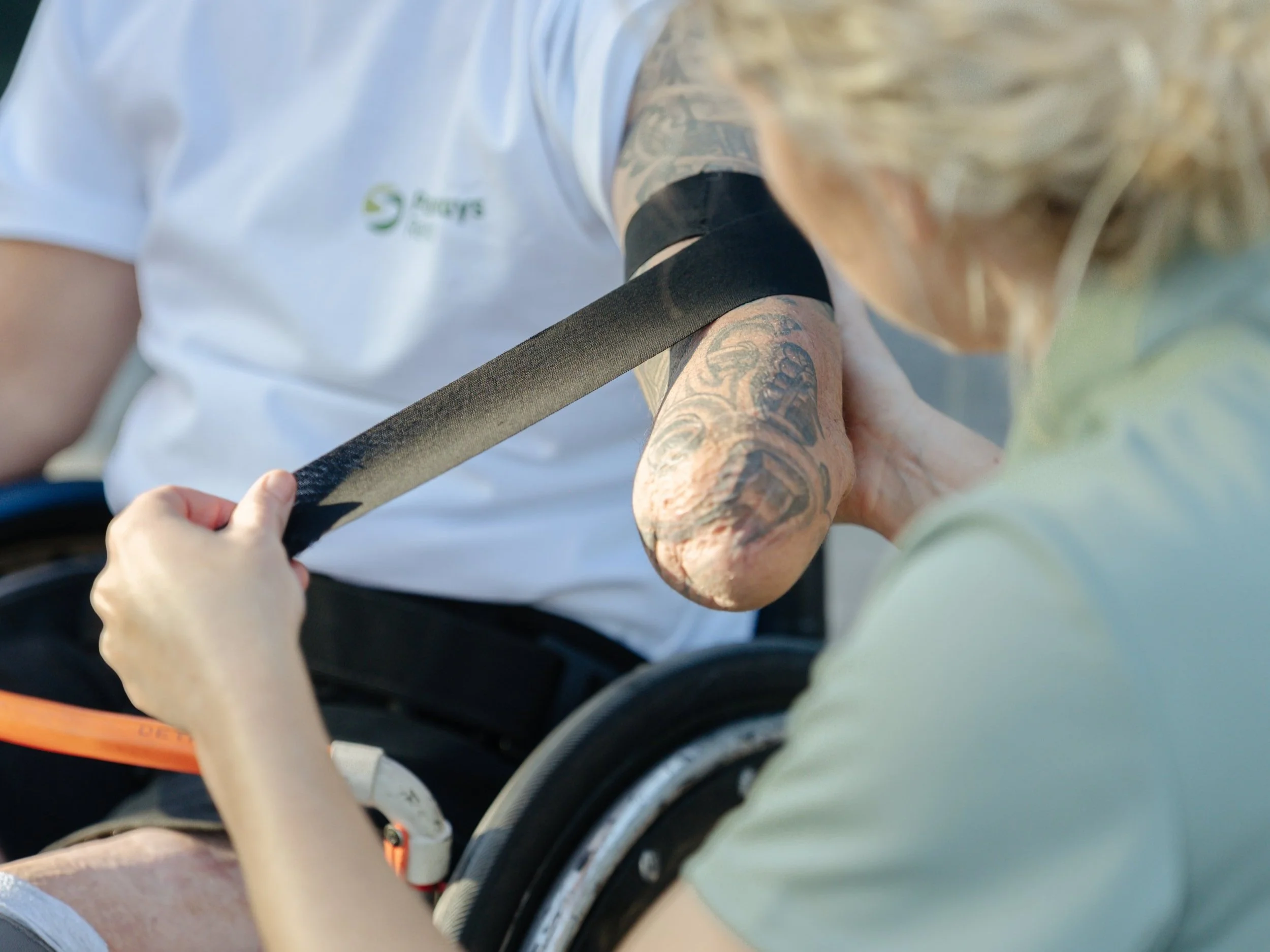
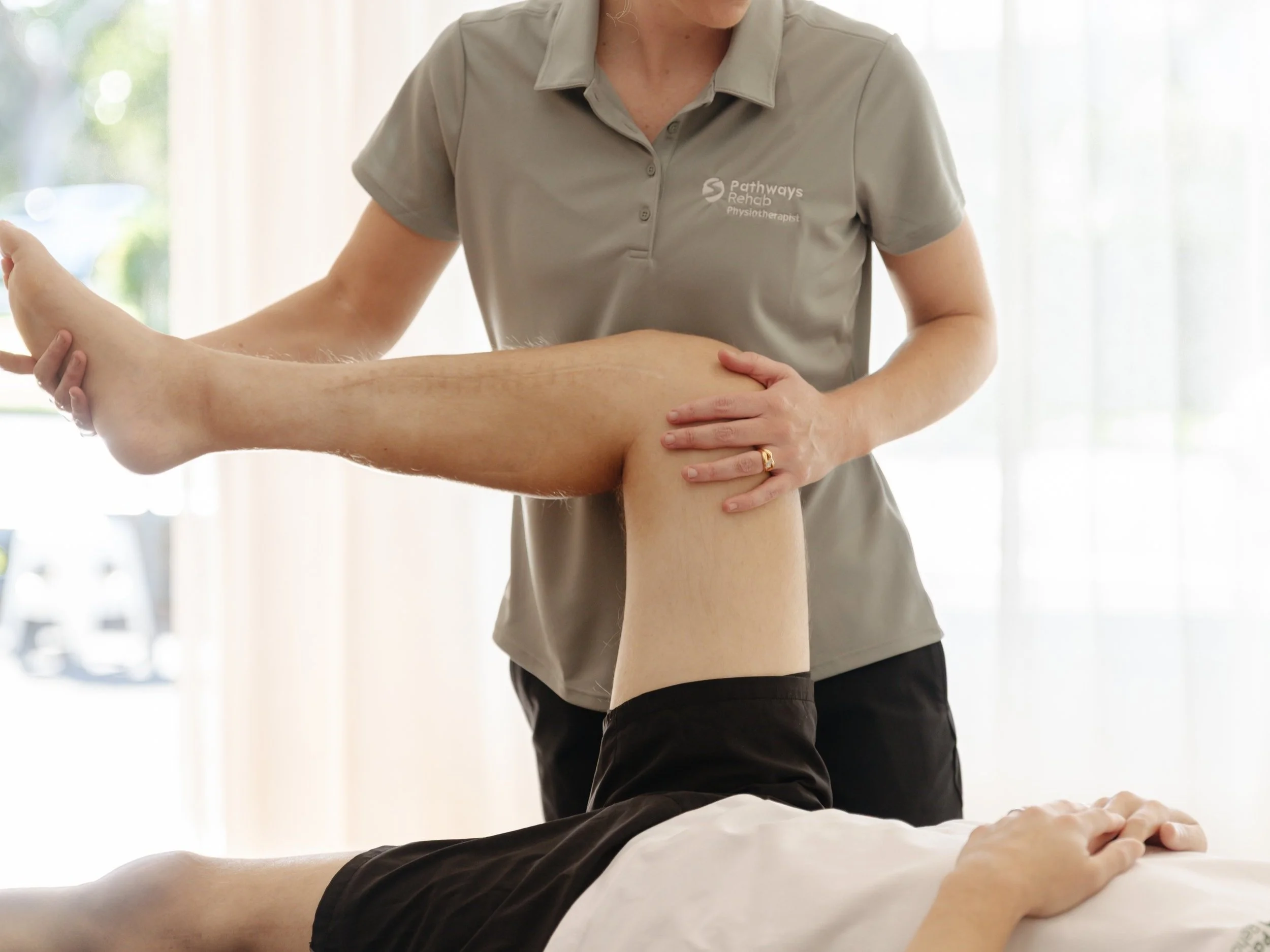
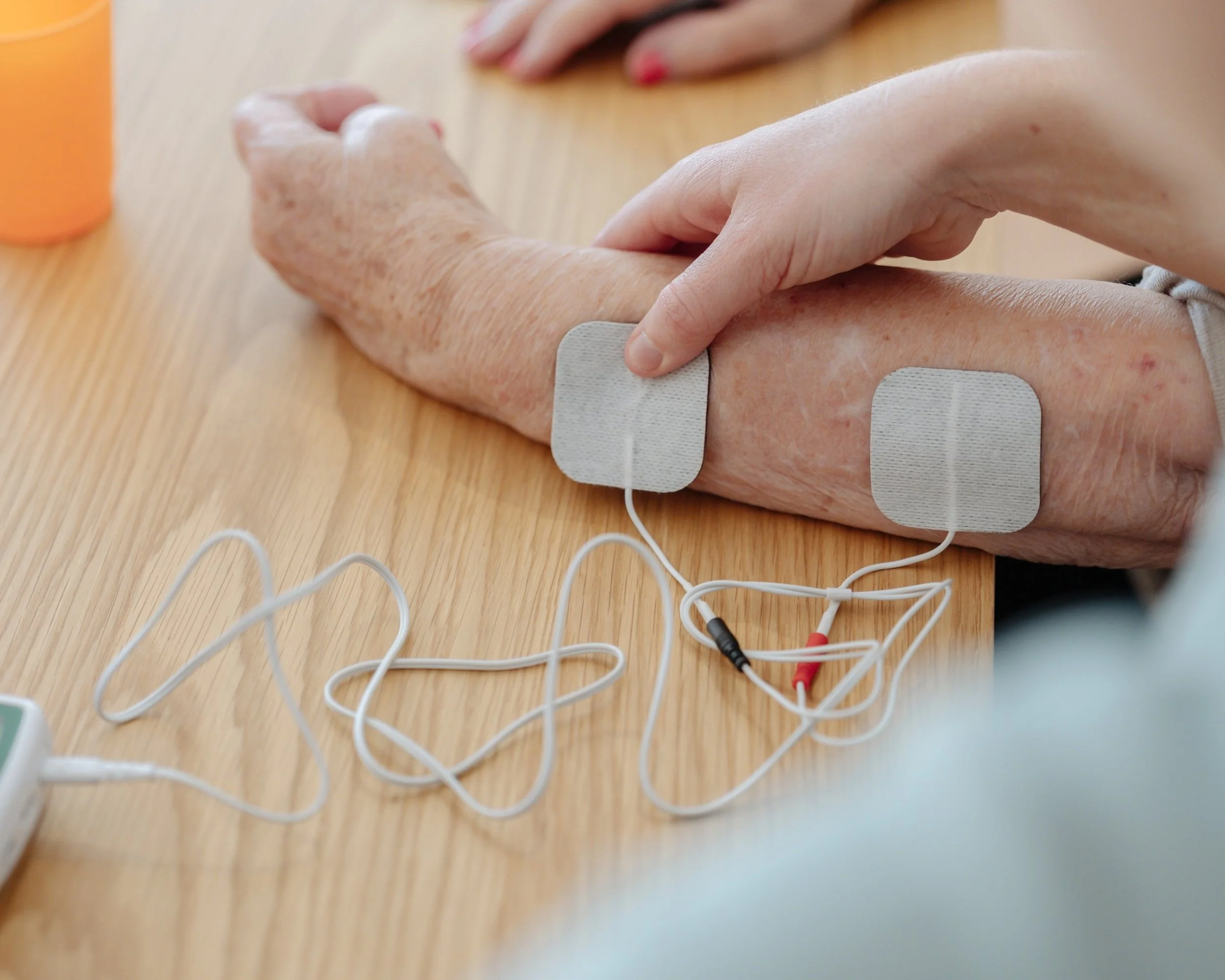
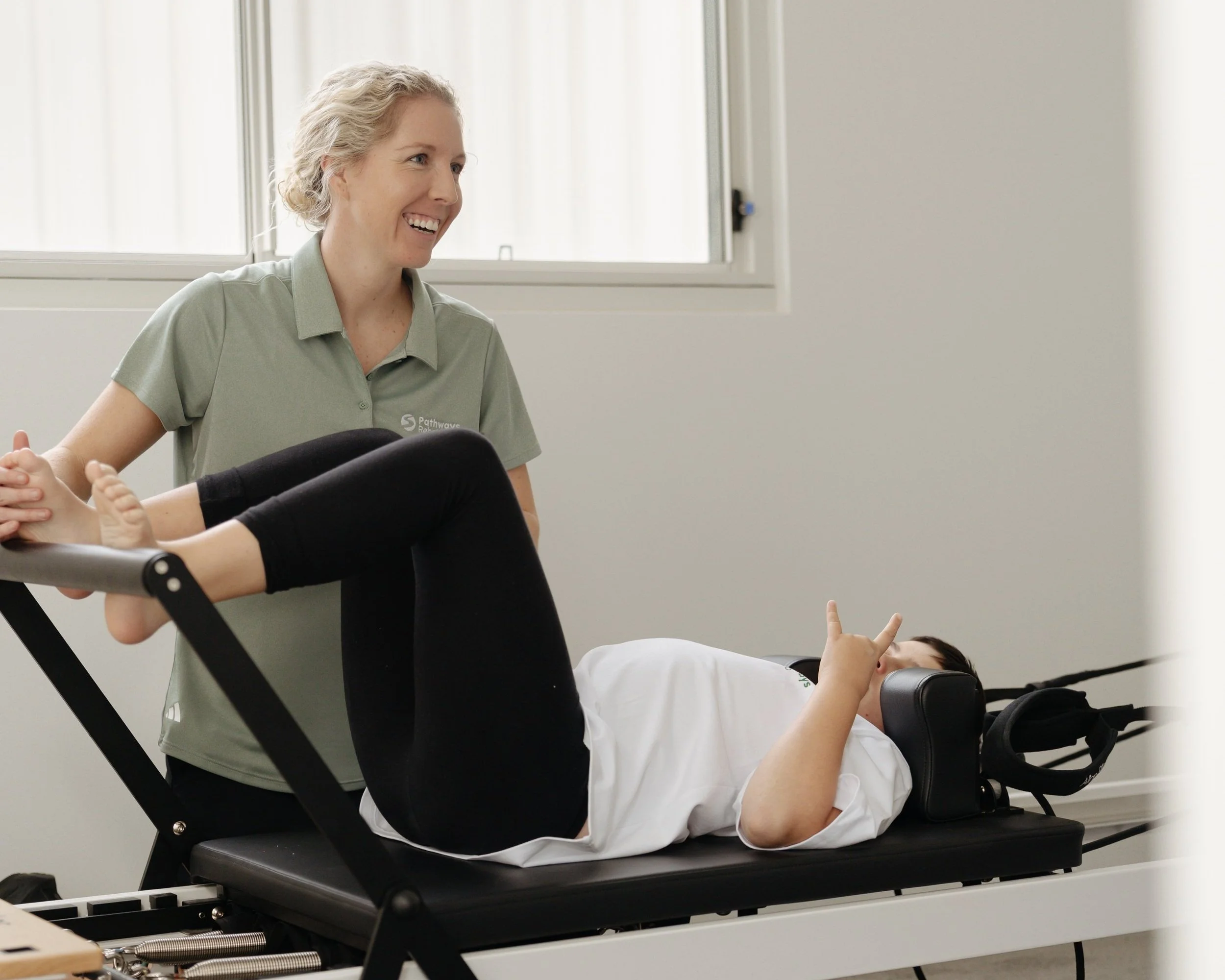
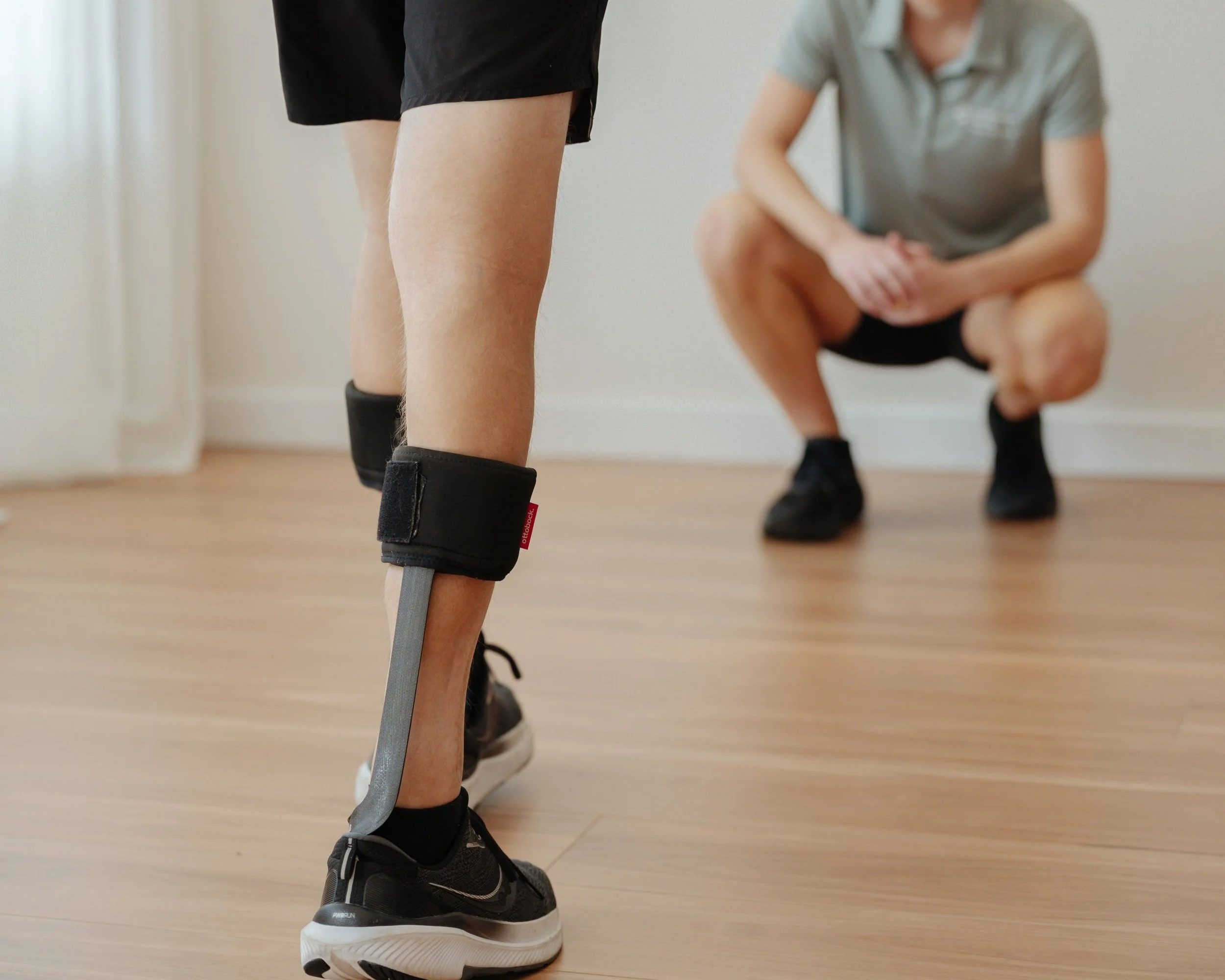
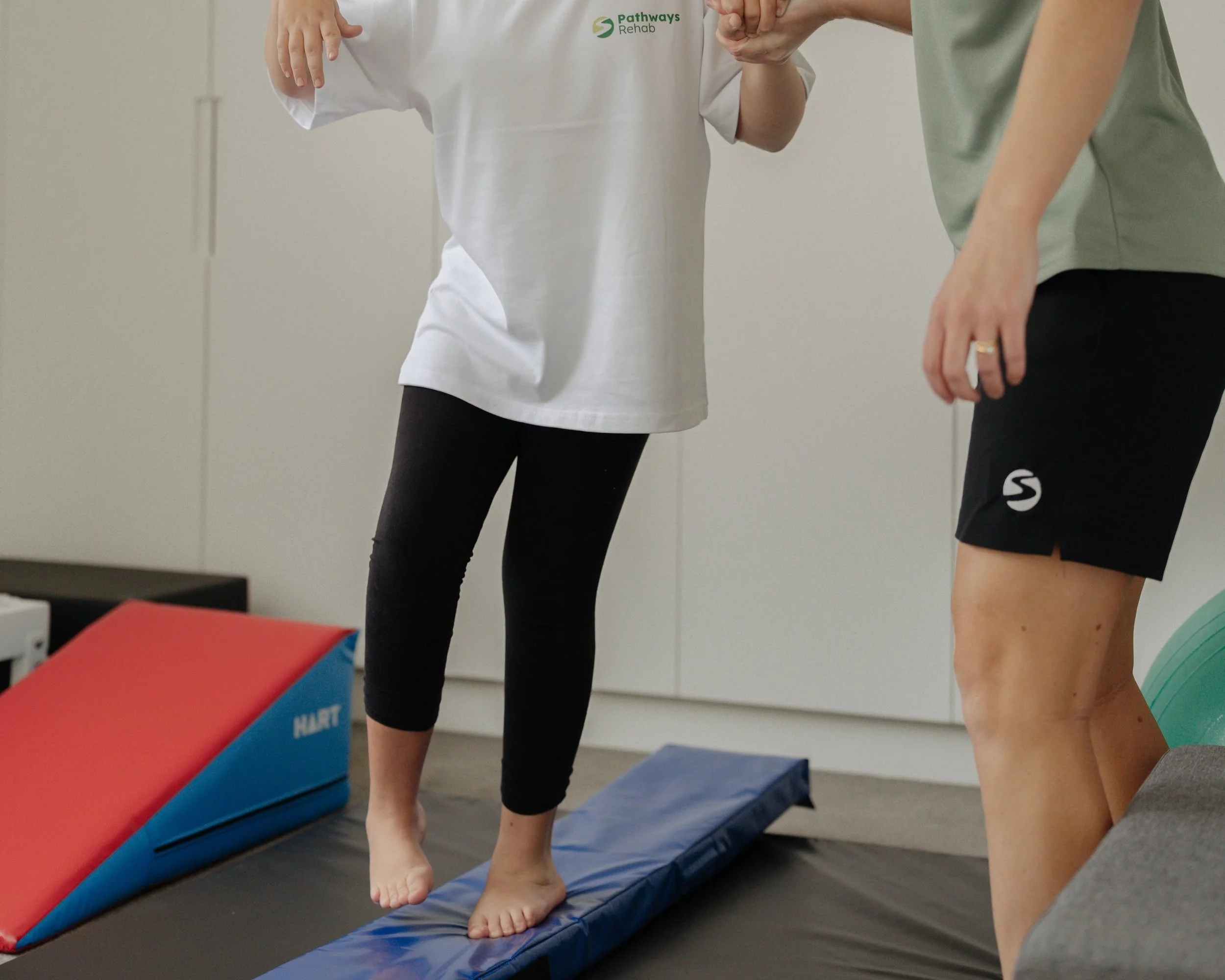
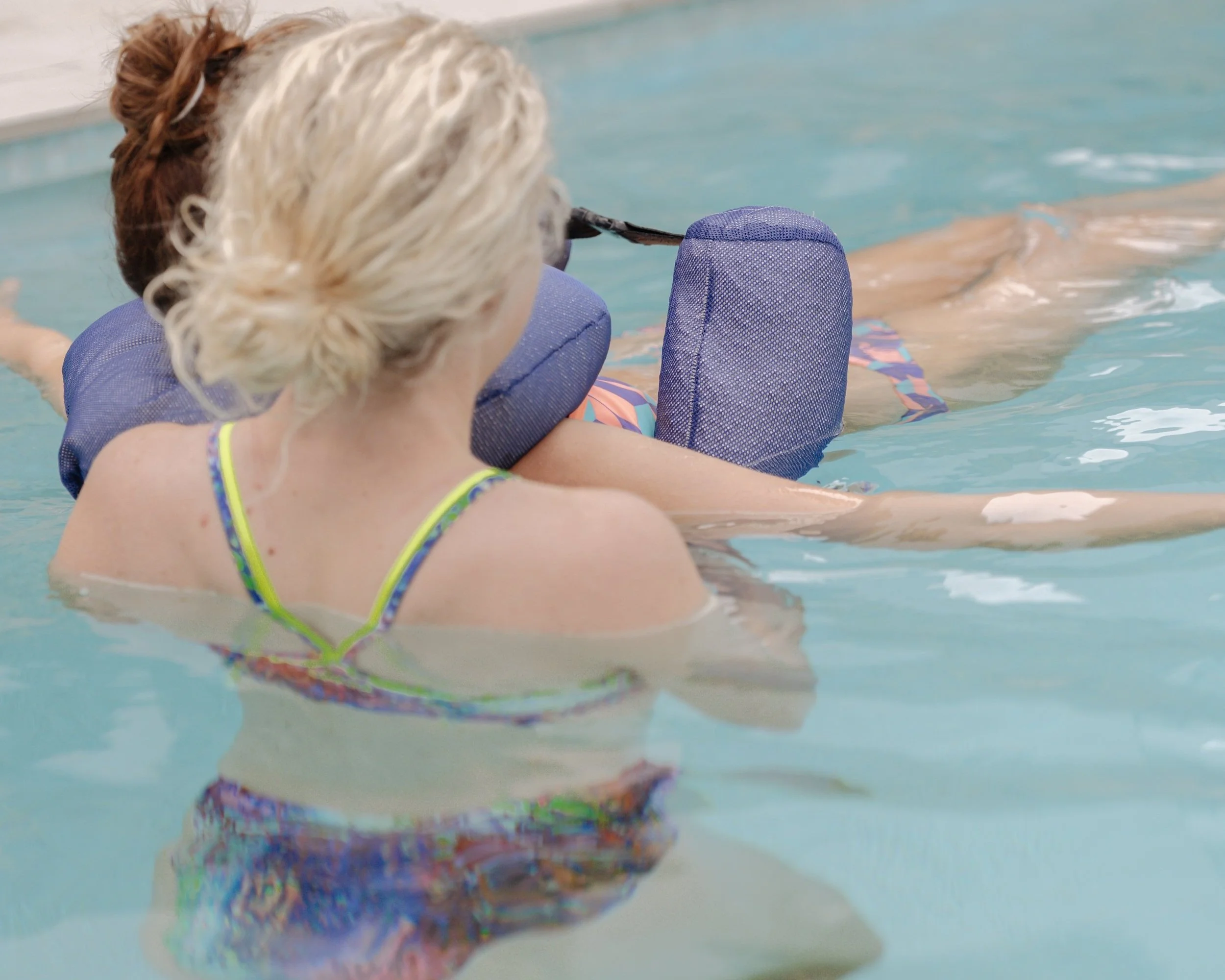
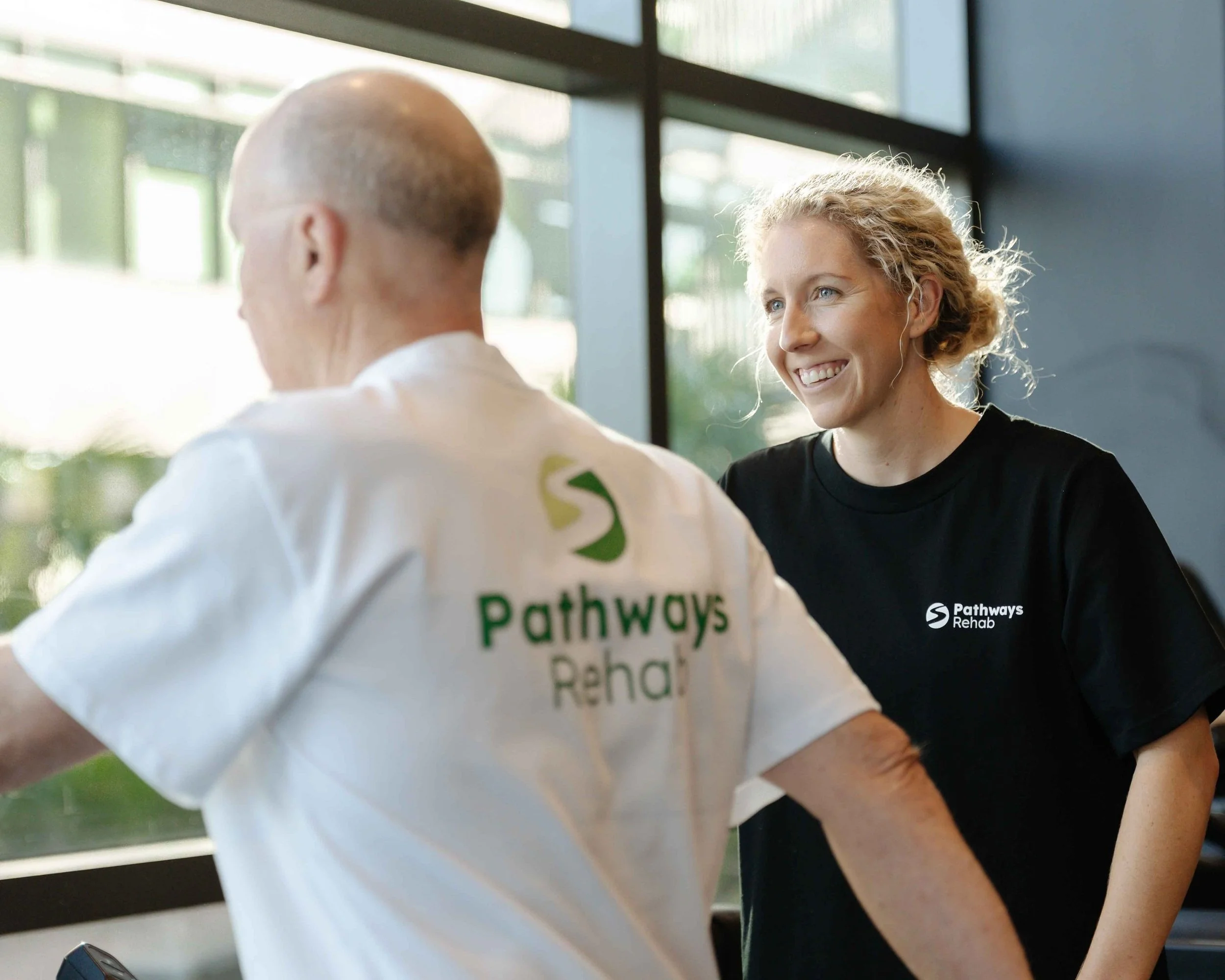
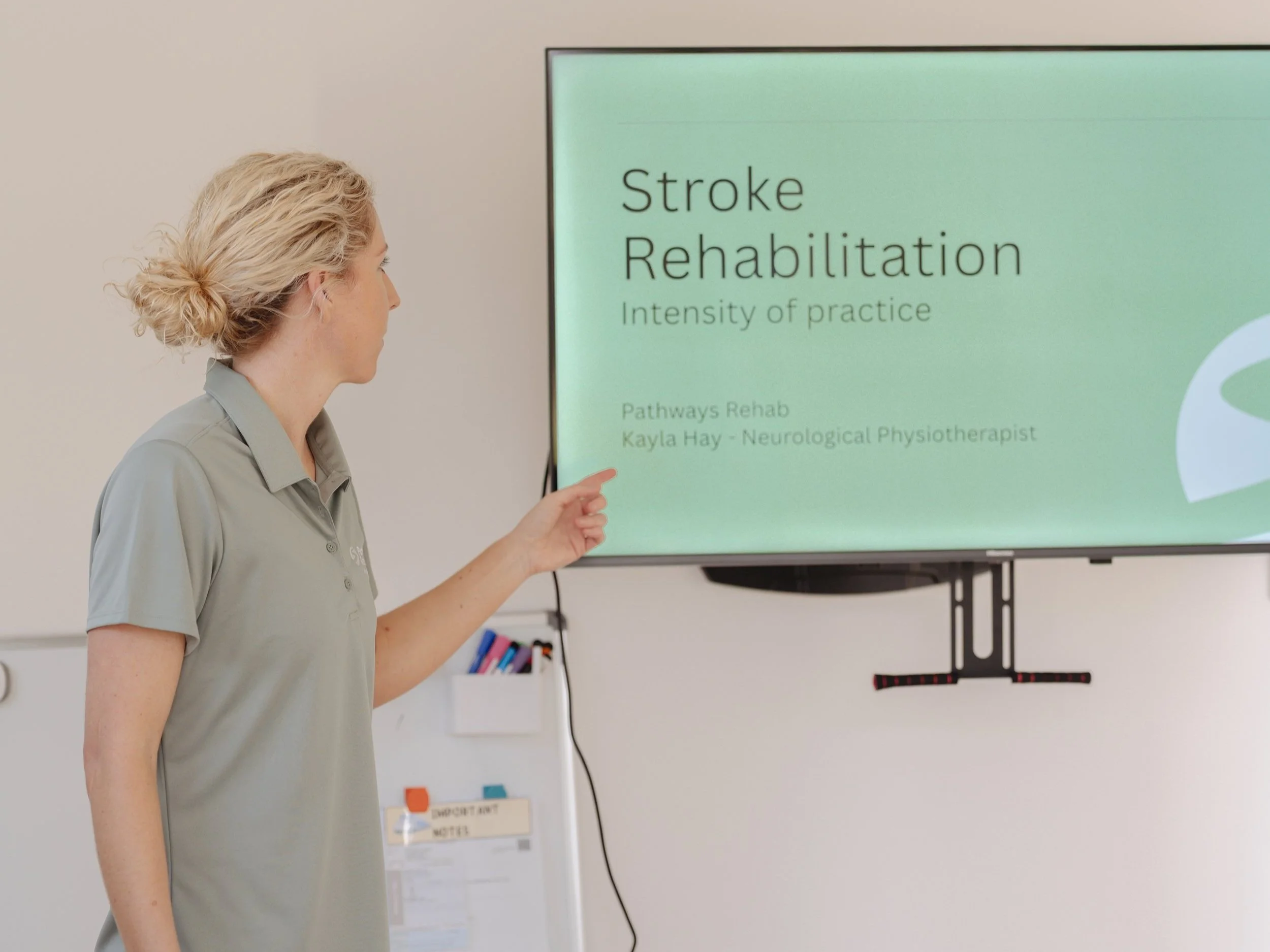
Who we work with
Pathways Rehab have the skills and expertise to assess and treat adolescents and adults with a range of neurological conditions and complex physical disabilities.
Click each condition to learn more.
-
A stroke occurs when blood flow to part of the brain is interrupted, either by a blockage or rupture of a blood vessel. Depending on the brain area area affected, stroke symptoms vary and cause problems with movement, sensation, speech, swallowing, vision, thinking, behaviour and energy levels.
How can physiotherapy help ?
Physiotherapy plays a crucial role in stroke rehabilitation, supporting the brain’s ability to rewire itself; called neuroplasticity, helping restore function and maximise recovery.Our services:
Comprehensive assessment - strength, coordination, balance, muscle tone, mobility
Education - fatigue, pain, and falls prevention
Practice and relearning of daily tasks - bed mobility, standing, transfers, walking
Upper limb and hand function training
Shoulder care and device use - electrical stimulation
Spasticity management
Recommendations of equipment - gait aids, orthotics, assistive technology
Carer training to support skill practice at home
Goal setting and support for community participation
Assistance with accessing funding bodies to support your needs
Coordination with your healthcare team for holistic care - neurologist, occupation therapist, speech therapist, exercise physiologist
-
FND causes neurological symptoms without structural damage to the brain or nerves. It's a problem with how the brain processes signals, like a software glitch, which can lead to symptoms like abnormal movement, sensation, speech, and overall function.
How can physiotherapy help ?
Physiotherapy helps retrain the brain-body connection, improving movement, coordination, balance, and confidence through individualised treatment plans.Our services:
Comprehensive assessment of movement, walking patterns and overall function
Education about FND and self-management strategies
Training and relearning of daily tasks - walking, stairs, transfers
Carer training to support skill practice at home
Equipment review and prescription for safety and independence
Aquatic therapy
Goal setting and support for community participation
Assistance with accessing funding bodies to support your needs
Coordination with your healthcare team for holistic care
-
MND is a group of progressive neurological disorders that affect the nerve cells responsible for controlling voluntary muscle movement. Over time, these motor neurons degenerate and die, leading to increasing muscle weakness, wasting, and loss of coordination and movement.
How can physiotherapy help ?
Physiotherapy supports people with MND by helping maintain mobility, comfort, and independence to enhance quality of life as the disease progresses. Physiotherapy can help address muscle weakness, movement and mobility problems, muscle cramps and spasms and provide respiratory support for weakened cough and breathing problems.
Services we offer:
Comprehensive assessment - movement, strength, muscle tone, respiratory function
Individualised exercise programs
Symptom management - spasticity, fatigue, pain
Education for family and carers - breathing support, positioning, home exercise programs
Manual handling training and equipment prescription - walking aids, transfer devices
Aquatic therapy
Chest physiotherapy to support breathing and prevent respiratory infection
Posture, positioning and seating advice to improve comfort and prevent complications
Goal setting to maintain independence and quality of life
Assistance with accessing funding bodies to support your needs
Coordination with your healthcare team for holistic care - neurologists, doctors, speech pathologists, occupational therapists
-
MS is an autoimmune disease where the immune system attacks the protective covering of nerves, disrupting communication between the brain and body. Depending on the type of MS, symptoms may come and go or progress over time. These may include fatigue, weakness, numbness, vision problems, coordination issues, and cognitive changes.
How does physiotherapy help ?
Physiotherapy helps manage MS throughout the course of the condition by maintaining mobility, function, and independence, with tailored treatment for symptoms such as weakness, fatigue, balance and coordination issues, gait problems, foot drop, spasticity, joint stiffness, pain, and breathing difficulties.Our services:
Comprehensive assessment - mobility, strength, coordination muscle tone, breathing
Education on symptom management - fatigue, heat sensitivity, pain
MS Get a Head Start program
Balance and gait training to reduce fall risk
Cognitive training to improve focus, memory and decision making
Functional training - walking, transfers, stair climbing, hand use
Spasticity and muscle tightness management
Carer training to facilitate skill practice and engagement in a home exercise program
Equipment prescription and advice for orthotic referrals
Aquatic therapy
Chest physiotherapy to improve breathing and prevent respiratory infection
Goal setting for community participation
Assistance with accessing funding bodies to support your needs
Coordination with your healthcare team for holistic care
-
Acquired brain injury is damage to the brain that may have been caused by trauma to the head e.g. fall or car accident, lack of oxygen, infection, or illness e.g. tumor. It can range from a mild concussion to more severe injury. Symptoms vary widely and can affect behaviour and personality, memory and learning abilities, communication and swallow, visual, sensory and physical movement.
How can physiotherapy help ?
Physiotherapy plays a crucial role in brain injury rehabilitation, supporting the brain’s ability to rewire itself known as neuroplasticity, helping restore function and maximise recovery.
Services we offer:
Comprehensive Assessment - strength, coordination, balance, muscle tone, mobility
Education on health after brain injury
Individualised exercise programs
Practice and relearning of daily tasks - bed mobility, standing, transfers, walking, stairs
Upper limb and hand function training
Spasticity management and advice
Recommendations of equipment - gait aids, orthotics, assistive technology
Carer training to support skill practice at home
Goal setting and support for community participation and return to sport
Assistance with accessing funding bodies to support your needs
Coordination with your healthcare team for holistic care - neurologist, occupation therapist, speech therapist, doctor, exercise physiologist
-
PD is a neurodegenerative disorder characterised by the gradual loss of dopamine, a neurotransmitter that plays a crucial role in coordinating smooth and controlled muscle movements.
How can physiotherapy help ?
Physiotherapy plays a pivotal role in PD, with substantial evidence supporting exercise and its effectiveness in slowing disease progression and improving motor function and overall quality of life.
What we offer
Comprehensive assessment - mobility, strength, balance, coordination, hand function, exercise tolerance
LSVT BIG and PD WARRIOR programs
Education on PD and tailored exercise programs targeting your problem areas
Task-specific training for everyday activities - walking, stair climbing, hand function
Movement and cueing strategies for freezing or complex tasks - rolling in bed, standing up
Balance and falls prevention training
Cognitive training to improve focus, memory and decision making
Carer training to support practice at home
Mobility aid and equipment advice
Goal setting for community participation
Assistance with accessing funding bodies to support your needs
Coordination with your healthcare team for holistic care - neurologists, doctors, speech and occupational therapists
-
A SCI occurs when there is damage to the spinal cord that disrupts communication between the brain and the body. This can result from trauma e.g. car accident or fall or non-trauma e.g. tumour or infection. The impact of a SCI varies based on the location and extent of the injury and can result in partial or complete loss of movement, sensation, and other body functions.
How can physiotherapy help ?
Physiotherapy plays a vital role in SCI rehabilitation by helping address muscle weakness, difficulty with walking or use of a wheelchair, reduced range of motion, spasticity or muscle tightness, respiratory dysfunction, pain, balance and coordination problems.
Our services:
Comprehensive assessment - mobility, strength, sensation, coordination, muscle tone
Education about SCI and recovery
Tailored exercise programs - strength, flexibility, cardio
Functional mobility and new skills practice - transfers, standing, walking or stairs
Spasticity and pain management
Equipment prescription - gait aids, advice for orthotic referrals, assistive technology
Upper limb and shoulder care management for wheelchair users
Aquatic therapy
Chest physiotherapy to improve breathing and prevent respiratory infection
Carer training and prescription of home exercise programs
Goal setting for community participation
Assistance with accessing funding bodies to support your needs
Coordination with your healthcare team for holistic care - neurologists, doctors, occupational therapists, exercise physiologists
-
An amputee is someone who has lost a limb due to injury, illness, or a congenital condition.
How can physiotherapy help ?
We offer full support throughout your journey with a prosthetic by improving strength, balance, mobility, and comfort.Our services:
Comprehensive assessment - stump integrity, range of motion, strength, balance, walking pattern
Personalised exercise programs for prosthetic use
Gait retraining to improve confidence, balance and gait efficiency with your prosthetic
Flexibility and stretching to promote mobility and reducing stiffness
Pain management for discomfort from limb loss or prosthetic use
Education on stump care and tools for self management of skin integrity
Equipment advice - walking aids, transfer equipment
Carer training to support skill practice at home
Goal setting and support for community participation
Assistance with accessing funding bodies to support your needs
Coordination with your healthcare team for holistic care - prosthetist, occupation therapist
-
We also have experience providing services to individuals with the following conditions:
Spinocerebellar Ataxia
Polio
Guillain Barre Syndrome
Hereditary Spastic Paraplegia (HSP)
Cerebral Palsy
Multisystem Atrophy (MSA)
Progressive Supranuclear Palsy
Friedreich’s Ataxia
Muscular Dystrophies
Huntington’s Disease
Can’t see your condition listed? Please get in contact via our website, email or phone. If we can’t assist you, we will direct you as best as we can to services that might better suit your needs.
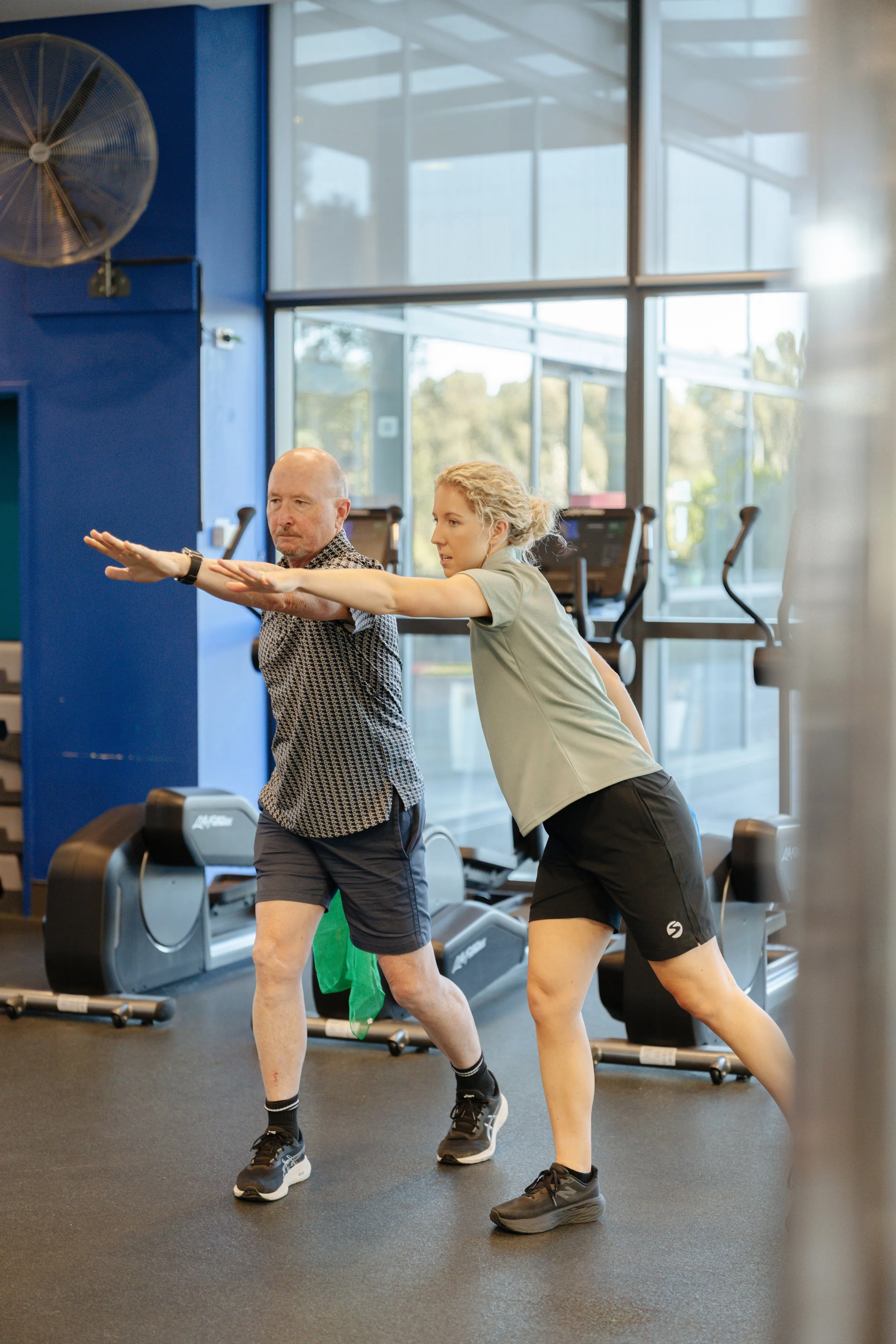
Where we see you
Pathways Rehab offers mobile physiotherapy across the Illawarra and Shoalhaven region, making therapy relevant and specific to your immediate environmental needs.

